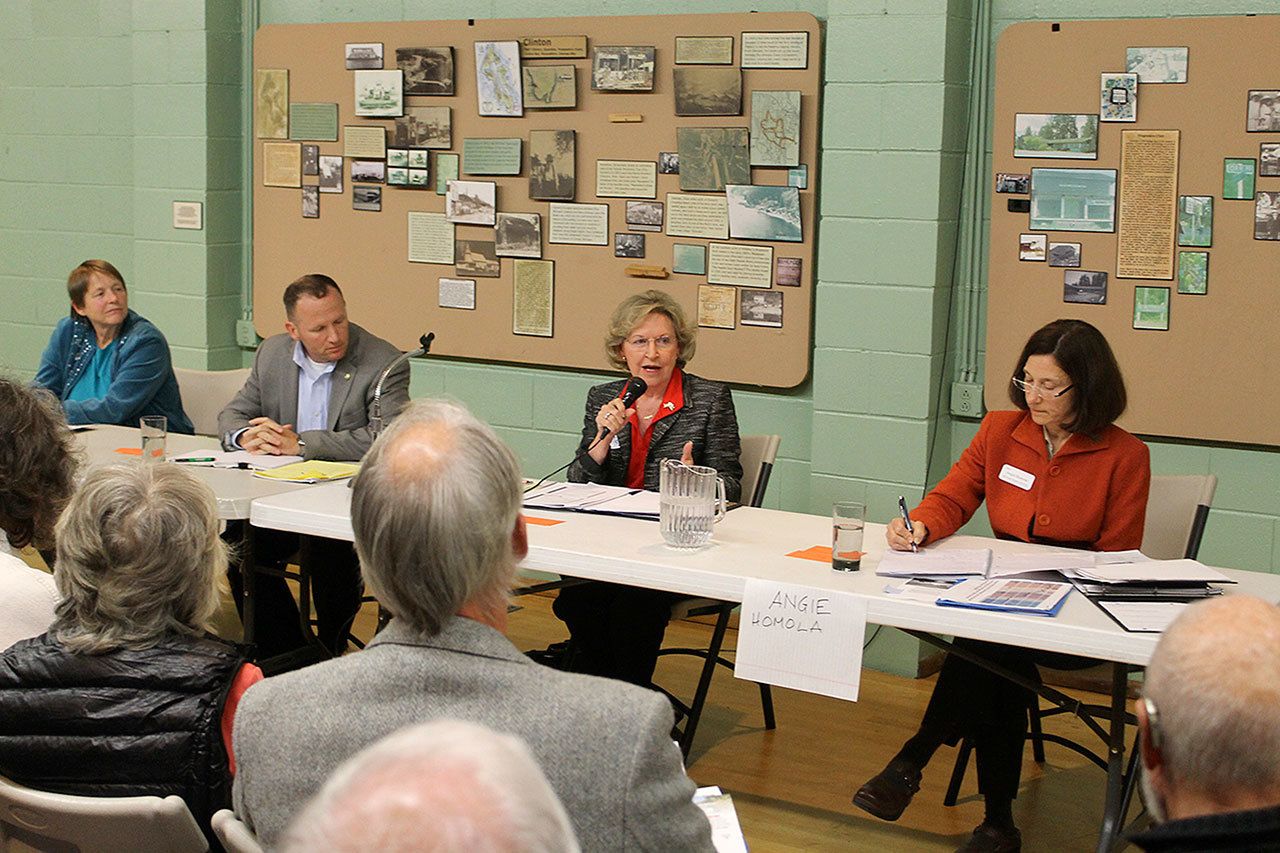Following a unified community effort for ferry improvements on the South End, Senator Barbara Bailey, R-Oak Harbor, said at an election forum Wednesday night that she has formally requested Washington State Ferries to assign the Suquamish, the fourth 144-car ferry, to the Clinton-to-Mukilteo route.
Three other candidates at the forum who are vying for the state’s district 10 House and Senate seats were also in support of the new ferry coming to the Clinton Ferry Terminal. It was the opening inquiry among nearly a dozen others asked at the forum, which was the second held this week by the South Whidbey Record and the Clinton Progressive Association. Both were held at the Clinton Community Hall.
Also discussed were overhead passenger loading, Clinton’s economic woes, funding for education, political contribution reform, climate change and identity theft.
Bailey, the incumbent, squared off against Angie Homola, D-Oak Harbor. Contesting for position 2 of the district 10 House were Dave Hayes, R-Camano, and Doris Brevoort, D-Mount Vernon.
Following the House and Senate candidates were pro and con arguments on Initiative 732 by Carbon Washington’s Duncan Clauson, a representative of the organization proposing the measure, and Jeff Johnson, president of the Washington State Labor Council. If approved, I-732 would impose a carbon emission tax on certain fossil fuels and fossil-fuel-generated electricity, reduce the sales tax by one percentage point and increase a low-income exemption, and reduce certain manufacturing taxes.
The opening discussion was spurred by one of the worst summers in recent memory for long ferry lines. The route is also the busiest in the state. According to the state Department of Transportation, the Clinton-to-Mukilteo route carried the highest number of vehicles in 2015: 2,237,947. The next closest was the Edmonds/Kingston route, which carried 2,124,721.
In addition to her request for a new ferry, Bailey said she has also asked for two studies to be conducted on how to mitigate long ferry lines and overhead loading. Homola said she would lobby to bring transportation dollars back to the district and would continue looking at how to improve and expand services for the route. She added that having ferries built in Washington and at Nichols Brothers in Freeland would also be one of her priorities if elected.
Hayes felt Clinton has been left behind in improvements along the Highway 525 “corridor” and that there needs to be a change in the way transportation projects are funded. He said two prior transportation projects were riddled with debt and that the future does not bode well for younger generations.
“We’re bonding these projects for 30 years out, so I don’t think that’s fair to our future generations,” Hayes said. “We need to change the way we’re funding our transportation projects.”
Regarding Clinton’s struggling economy, Brevoort said bringing the community together to identify the town’s priorities would be an effective first step in addressing the issue. Hayes said protecting Clinton’s rural small-town character while building upon cottage industries — a business or manufacturing activity conducted out of a person’s home — would benefit its economy.
Homola said improving roads, providing tourists with steady beach access and making sure bike routes are available up and down the island were a few ways of improving its economy. Bailey said giving people a reason to stop in Clinton while traveling to and from the ferry is key. She said one of the hidden treasures on the island is Clinton and that a combined effort of existing shops and industries would prove valuable.
“You’ve got a lot people coming through; take advantage of it, make it work for you,” Bailey said.
Homola said that the state has a “huge problem” and “moral obligation” when addressing the funding of the Washington State Supreme Court’s 2012 McCleary decision. The measure is intended to help fully K-12 public education by 2018.
She said the first step will be closing antiquated loopholes, followed by tax equity.
“We have the most regressive tax system in the whole country,” Homola said. “I think that’s something we’re going to have to really look at.”
Hayes said there is money available to go toward funding education and that the answer may lie in some form of a levy swap.
Brevoort and Homola were both in favor of preparation in face of climate change and other problems specific to Whidbey Island, such as sea level rise and earthquakes.
“We don’t know how long it will be until the big one,” Brevoort said. “We know that it will come any day, so we need to be ready.”
Questions fielded by Clauson and Johnson in the final segment of the evening included how long the tax would last, where the money would go if carbon dioxide levels are reduced and how a person can determine how much carbon dioxide they produce.
In response to Johnson saying there are holes in I-732, Clauson said the issue has been on the table since 1988 and that while the initiative is not perfect, it is better than the alternative — no policy decisions at all.
“Is I-732 perfect? Absolutely not,” Clauson said. “Does 732 solve all of our state’s issues and do everything we need it to do? Absolutely not.”
“That’s my challenge to you and your coalition: put a policy on the table that we can talk about and agree on that fills the gaps that you think exist in 732 and maybe we can work together to fill those gaps. Right now, we have a choice and we need to make the right choice and that’s ‘yes’ on 732.”
House seat position 1 incumbent Norma Smith, R-Clinton, concluded the night with a statement. Her challenger — Michael Scott, L-Camano — declined to attend and a Record moderator read his prepared written statement.


